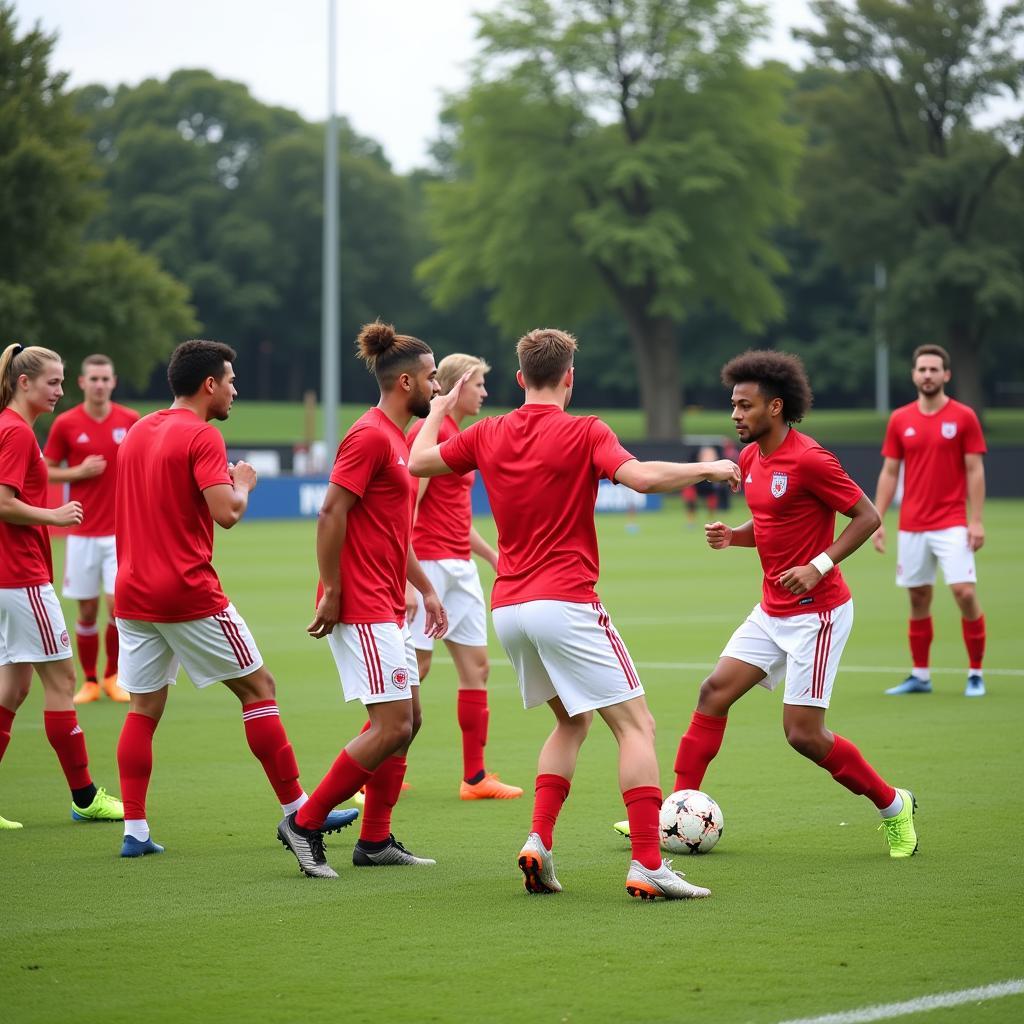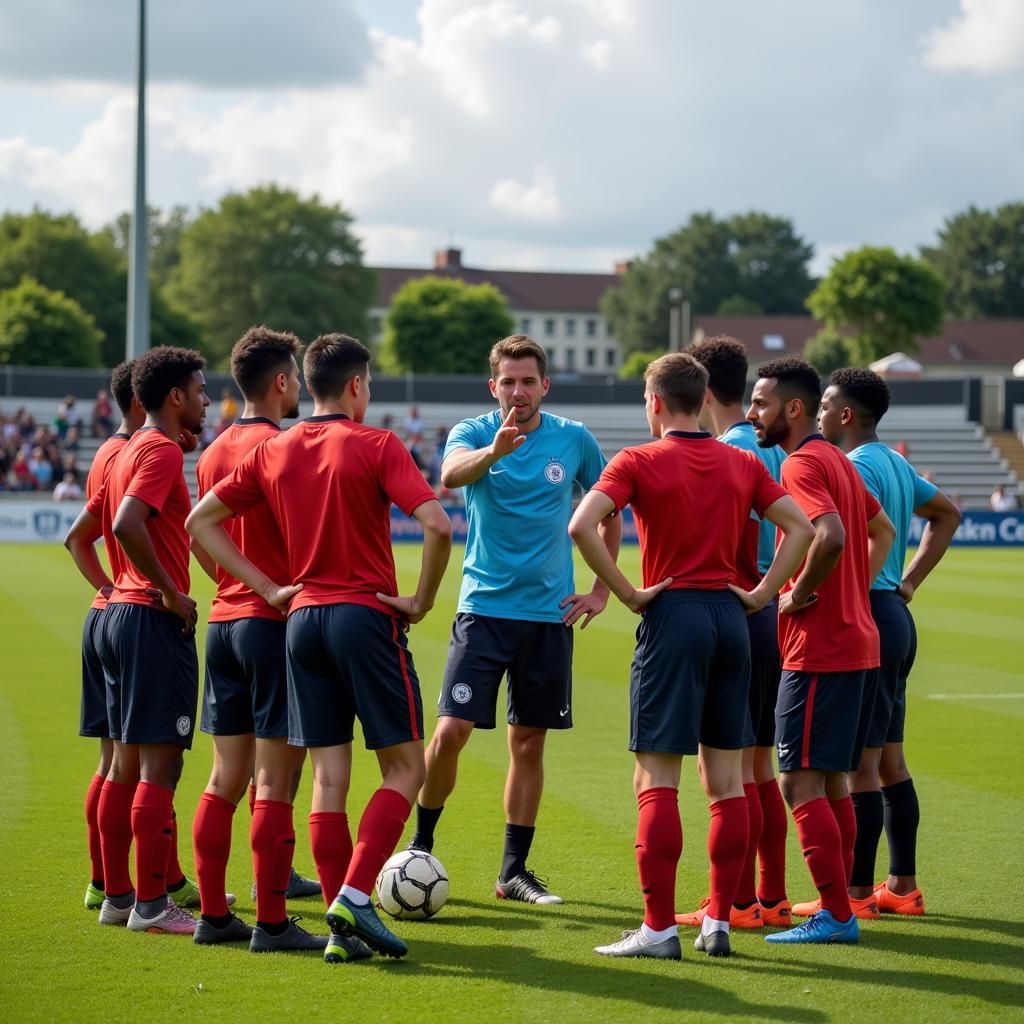How Soccer Players Train: A Look Inside the Pros’ Routine
October 26, 2024As a professional soccer player, training is the lifeblood of my game. It’s the foundation upon which success is built, the daily grind that separates the good from the great. While fans see the electrifying goals and tactical brilliance on match day, it’s the countless hours on the training ground that make it all possible. So, what exactly goes into a soccer player’s training regimen? Let’s delve into the rigorous and multifaceted world of professional soccer training.
The Components of Soccer Player Training
Elite soccer training is a holistic endeavor, encompassing a wide range of physical, technical, tactical, and mental aspects.
1. Physical Conditioning: Building a Powerful Engine
At the heart of soccer training lies physical conditioning. Players need exceptional stamina to cover vast distances during a match, sprinting, jumping, and engaging in intense physical duels.
-
Endurance training: This involves long-distance running, interval training, and small-sided games designed to improve cardiovascular fitness and muscular endurance.
-
Strength and power training: Players hit the gym to enhance their strength, power, and explosiveness. Exercises focus on major muscle groups, utilizing weights, resistance bands, and bodyweight exercises.
-
Agility and speed drills: These drills involve cone work, ladder drills, and plyometrics, enhancing players’ ability to accelerate, decelerate, change direction quickly, and maintain balance.
2. Technical Mastery: Honing Skills to Perfection
Technical proficiency is paramount in soccer. Players train relentlessly to master the fundamental skills that form the bedrock of their game.
-
Ball control: Dribbling through cones, passing drills, and first-touch exercises are essential for developing impeccable ball control, allowing players to manipulate the ball with precision and confidence.
-
Passing and receiving: Accurate passing is crucial for maintaining possession and creating scoring opportunities. Players engage in various passing drills, focusing on weight, accuracy, and timing.
-
Shooting: Scoring goals is the ultimate objective, and players dedicate significant time to perfecting their shooting technique. From powerful volleys to delicate chips, mastering different types of shots is crucial.
 Soccer players practicing passing drills
Soccer players practicing passing drills
3. Tactical Acumen: The Brain of the Game
Soccer isn’t just about individual brilliance; it’s a team sport that demands tactical understanding and execution.
-
Formation training: Players practice different formations, understanding their roles and responsibilities within the team structure.
-
Positioning and movement: Tactical drills focus on off-the-ball movement, creating space, and exploiting gaps in the opposition’s defense.
-
Set-piece routines: Corners, free kicks, and throw-ins present scoring opportunities. Teams meticulously rehearse set-piece routines to gain an edge over their opponents.
4. Mental Fortitude: The Winning Mentality
The mental aspect of soccer is often overlooked but is as crucial as physical prowess.
-
Concentration and focus: Maintaining concentration amidst distractions and pressure is vital. Players use visualization techniques and mindfulness exercises to enhance focus.
-
Resilience and determination: Setbacks are inevitable, but it’s the ability to bounce back stronger that separates the best.
-
Teamwork and communication: Effective communication and understanding between teammates are essential for success on the pitch.
 Soccer team huddle for tactical discussion
Soccer team huddle for tactical discussion
The Importance of Rest and Recovery
Intense training requires adequate rest and recovery to prevent injuries and optimize performance.
-
Sleep: Getting 8-10 hours of quality sleep is crucial for muscle recovery and growth.
-
Nutrition: A balanced and nutritious diet provides the fuel necessary for intense training and match performance.
-
Hydration: Staying adequately hydrated is crucial, especially during training sessions.
-
Active recovery: Light activities like swimming or cycling help promote blood flow and reduce muscle soreness.
Conclusion: The Pursuit of Excellence
The life of a professional soccer player demands dedication, discipline, and an unwavering commitment to continuous improvement. From grueling fitness sessions to meticulous technical drills, each aspect of training is meticulously designed to maximize performance and achieve success on the field. It’s this relentless pursuit of excellence that captivates audiences worldwide and makes soccer the beautiful game it is.
FAQs
1. How often do professional soccer players train?
Professional players typically train 5-6 days a week, with sessions lasting 1-2 hours.
2. What is the most important aspect of soccer training?
All aspects are interconnected, but technical skills and physical conditioning are fundamental.
3. How can I improve my soccer skills?
Consistent practice, focusing on basic skills like passing, dribbling, and shooting, is key.
4. What should I eat before a soccer training session?
A light meal or snack with carbohydrates and protein, consumed 2-3 hours before training, is ideal.
5. How can I prevent injuries during soccer training?
Proper warm-up, cool-down, and listening to your body are crucial for injury prevention.
6. Do soccer players train differently depending on their position?
While the core principles remain the same, training can be tailored to the specific demands of each position.
7. How important is mental training for soccer players?
Mental fortitude is crucial for handling pressure, maintaining focus, and overcoming setbacks.
Need More Help?
For any further assistance or inquiries, please don’t hesitate to contact us.
Phone: 0396443476
Email: fanhaaland@gmail.com
Address: 23 Tháng 3, Đắk Nia, Gia Nghĩa, Đắk Nông, Việt Nam.
Our dedicated customer support team is available 24/7 to assist you.